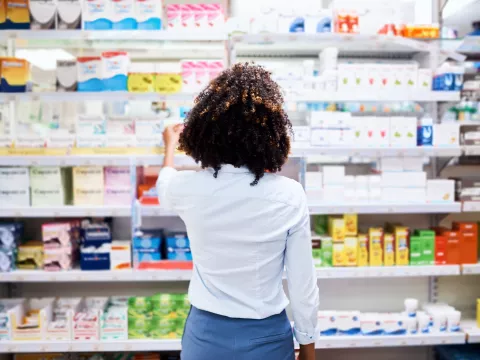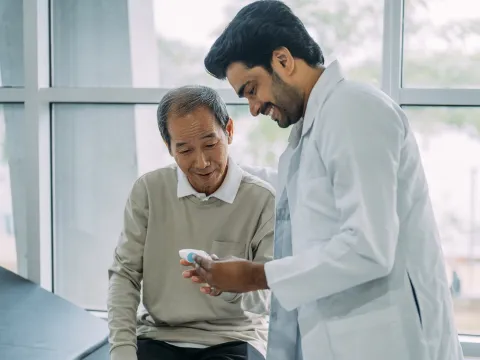- AdventHealth

Choose the health content that’s right for you, and get it delivered right in your inbox.
Being caught off guard in any emergency is a worst-case scenario. Everything comes down to how well you are prepared to handle the unexpected, before it becomes an emergency. First aid kits are the first line of defense for many injuries, including bruises, cuts, burns and inflammation. There’s never a better time than the present to restock or even create your family’s first aid kit.
Why are First Aid Kits Important?
First aid kits are essential for a variety of reasons. They enable us to provide immediate care during accidents, injuries or sudden illnesses, which can make a critical difference in outcomes. These kits contain a variety of supplies to help prevent minor injuries from becoming more severe and stabilize conditions until professional medical help arrives. This versatility makes first aid kits vital for homes, workplaces, and communities, promoting safety and well-being.
Additionally, first aid kits can contribute to disaster preparedness, legal compliance and peace of mind, ensuring people are better prepared for the unexpected.
First aid kits are indispensable tools for quick and effective emergency response. They play a significant role in injury prevention, safety at home and work, legal compliance and community well-being, ultimately providing reassurance and promoting a proactive approach to health and safety.
20 First Aid Kit Essentials to Get Started
Adhesive Bandages
Bandages are required to stop or control bleeding and cover up the wound to protect it from
infection. Keep a handful of bandages of every size to care for wounds of any size.
Antibiotic Ointment
Whether a wound is old or new, antibiotic ointment is necessary to protect your body from infections. Sometimes, an old wound could open up again. It’s important to have antibiotic ointment on hand to keep your wounds clean.
Antihistamines
These are crucial in managing allergic reactions like insect bites or allergy-related skin conditions.
Burn Cream or Gel
Burn treatment is essential for soothing and preventing infection in the event of burns, whether from heat, chemicals or sun exposure.
Disposable Gloves
Wearing gloves during first aid procedures helps protect both the caregiver and the injured person by reducing the risk of spreading infection and contamination.
Elastic bandages
Elastic bandages provide support and compression to injured joints, such as ankles, wrists or knees and help reduce swelling and stabilize injuries.
Emergency Contact Numbers
Having readily available emergency contact information ensures you can quickly contact medical professionals or authorities in a crisis.
First Aid Manual or Instructions
Instructions for providing first aid are crucial, especially for those who may not have formal first aid training, as they provide guidance on proper procedures.
Hand Sanitizer
It is important not to treat an injured person before properly washing your hands. If you cannot wash your hands with soap and hot water, hand sanitizer is the next best option. Ensure your hands are clean before touching any open wounds, whether yours or a family member’s.
Instant Cold Packs
These packs help reduce swelling and alleviate pain in cases of strains, sprains or minor injuries.
Pain Relievers
Over-the-counter pain relievers like aspirin or ibuprofen can help alleviate pain and discomfort in various situations, such as headaches or minor injuries.
Resealable Plastic Bags
Used for disposing of contaminated materials, they prevent the spread of infection and maintain a sanitary first aid environment.
Safety Pins
Safety pins are useful for securing bandages or makeshift slings. They help stabilize and protect injuries from additional movement.
Scissors
Scissors are handy for cutting tape, clothing or bandages. Scissors enable quick and safe access to injuries, efficient dressing application and enhanced first aid capabilities.
Sterile Saline Solution
Saline solution safely cleans debris and foreign objects from wounds or eyes.
Sterile Eye Wash Solution
Sterile eye wash solution is crucial for flushing and cleaning the eyes in cases of chemical exposure or foreign body entry, preventing potential eye damage and discomfort.
Sterile Gauze Pads and Adhesive Tape
Gauze pads and tape are essential for covering and securing larger wounds, providing a sterile environment for healing, and preventing infection.
Thermometer
Thermometers help monitor a person’s health status. If you are waiting on emergency help, keeping an eye on the patient’s temperature is great information for the professionals. If their temperature is rising rapidly, it’s important to inform the emergency team as soon as they are onsite.
Triangular Bandage
These bandages can be used to create slings, tourniquets or head coverings, providing support and protection for injured limbs or wounds.
Tweezers
Tweezers are useful for removing ticks or foreign objects from wounds. Tweezers are also instrumental in safely removing splinters, which can cause pain and infection if left untreated.
Trust Our Experts for Fast and Reliable Treatment
At AdventHealth, we believe health should be measured in terms of the whole person — body, mind and spirit. When emergencies happen, trust our experts will be by your side, providing compassionate whole-person care. Find an AdventHealth emergency room near you.




